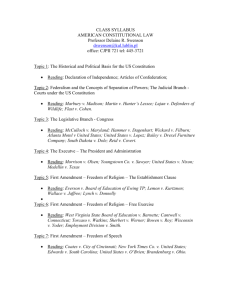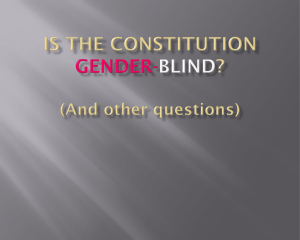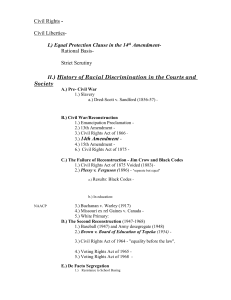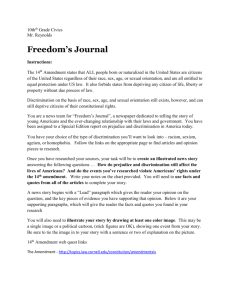Fisher v. University of Texas and Other Current and Recent Cases
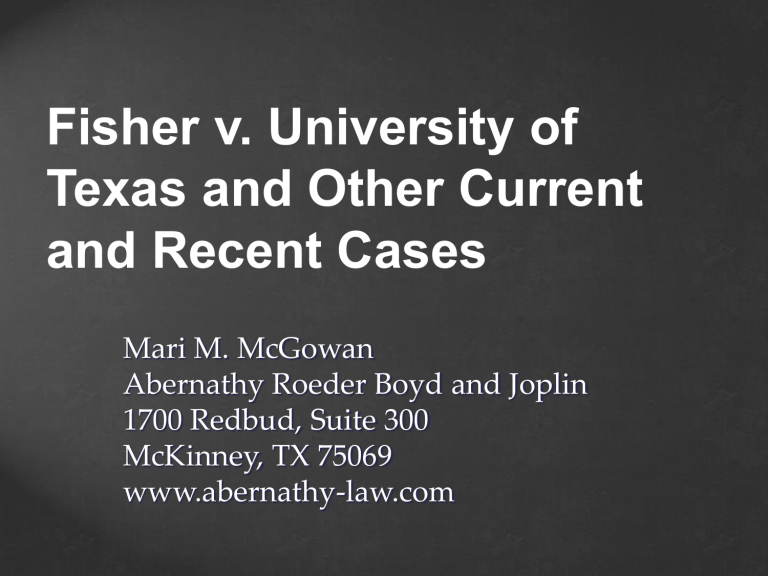
Fisher v. University of
Texas and Other Current and Recent Cases
Mari M. McGowan
Abernathy Roeder Boyd and Joplin
1700 Redbud, Suite 300
McKinney, TX 75069 www.abernathy-law.com
Student Issues
Fisher v. University of Texas at Austin
631 F.3d 231 (5 th Cir. 2011)
Two university applicants challenged the use of race in undergraduate admissions, alleged violations of their right to equal protection under the
Fourteenth Amendment and 42 U.S.C.S. §§ 1981, 1983, and 2000d et seq.
The Court of Appeals found that the university's consideration of race was one part of a complex admissions process operating when the applicants were rejected. The university ’ s admissions plan was modeled after the plan approved by the Supreme Court in the 2003 case, Grutter v. Bollinger:
No quotas
No racial balancing
Demographics not consulted as part of any individual admissions decision
No racial groups or minorities were treated differently than others when reviewing individual applications.
Finding in favor of the university, the court found that the university gave appropriate attention to those educational benefits identified in the Grutter decision without overstepping any constitutional bounds.
The U.S. Supreme Court heard oral arguments last October.
Post-Graduate Employment Data:
Dude, Where
’
s My Job?
Several lawsuits have been filed by students alleging law schools ’ misleading employment and salary data amount to fraud and misrepresentation.
Courts offer no sympathy:
Austin et al. v. Albany Law School of Union University 957 N.Y.S.2d 833
(N.Y. Sup. Ct. 2013)
Rejected Plaintiffs ’ claims based upon publication by the law school of graduate employment data that included positions for which a J.D. was not required or preferred; temporary and part-time positions; positions funded by the law school; and solo practitioners.
The court observes that reasonable college graduates grappling with major life decisions concerning a career and the pursuit of a professional degree would not read a host of assumptions about legal employment into an unembellished “ employment rate ” published by the law school without confirming the accuracy of their assumptions.
Post-Graduate Employment Data (Cont ’d)
MacDonald et al. v. Thomas M. Cooley Law School et al .(July 23,
2012) 880 F. Supp. 2d 785 (W.D. Mich. 2012)
The court held that the employment and salary data provided by defendant and other law schools in ABA-required format are “ so vague and incomplete as to be meaningless and could not reasonably be relied upon. But, as put in the phrase we lawyers learned early in law school — caveat emptor .
”
See also:
Gomez-Jimenez et al. v. New York Law School, 956 N.Y.S.2d 54 (N.Y.
App. Div. 1st Dep't 2012);
Phillips et al. v. DePaul University, 2012 U.S. Dist. LEXIS 34033
(N.D. Ill. Mar. 14, 2012).
Title VII: Rouse v. Duke University
869 F. Supp. 2d 674 (M.D.N.C. 2012)
A Duke University student alleged that the university ’s investigation in response to her reported rape was inadequate and amounted to a
Title IX violation.
The federal district court granted summary judgment for Duke
University, holding that its allegedly deficient investigation and response of fraternity hosting party at which plaintiff was raped was not a violation of Title IX.
The court states that the allegedly inadequate investigation of the fraternity hosting the party did not cause plaintiff to undergo further harassment or make her more liable or vulnerable to it and therefore cannot serve as the basis for institutional Title IX liability.
The court further holds that a claim that the alleged failure to conduct an adequate investigation itself created a hostile educational environment fails because there was “ no evidence such failure was based on gender.
” “ To the contrary, ” the Court observed, “ the evidence propounded by [the plaintiff] suggests financial motives.
”
Emotional Support Animals:
Velzen v. Grand Valley State University
2012 U.S. Dist. LEXIS 145666 (W.D. Mich. Oct. 10, 2012)
Background : The 2011 revised ADA regulations clarified that animals whose sole function is to provide comfort or emotional support do not qualify as service animals under the ADA. See 28 C.F.R. § 35.104
(2011).
Velzen was a student residing in on-campus housing at Grand Valley
State University, which had a no-pet policy. Velzen had medical documentation stating that she needed her pet guinea pig, Bianca, for
“ controlling stress and managing symptoms ” of her depression and heart condition.
The university relied on the ADA definition of “service animal” in its defense. However, the court found that “ regardless of the new stricter standards under the ADA for service animals, Plaintiffs may still make out a claim under the Rehabilitation Act for failure to accommodate emotional support animals.
” Accordingly, the Court denied the university ’ s motion to dismiss the student ’ s claims under the Fair
Housing Act and Section 504 of the Rehabilitation Act “ pursuant to the failure to accommodate theory.
”
First Amendment: OSU Student Alliance v. Ray
699 F.3d 1053 (9th Cir. 2012)
Oregon State University students alleged that the officials confiscated news bins on the basis that they contained a conservative student newspaper and acted pursuant to an unwritten and previously unenforced policy that denied permission to replace the bins anywhere but in two designated areas.
The Ninth Circuit Court of Appeals found that plaintiff/appellant independent student newspaper ’ s complaint adequately stated First Amendment, Equal
Protection and Due Process violations arising from the removal without notice by campus personnel of the newspaper ’ s campus news bins based on a standardless policy and on viewpoint discrimination.
Because Oregon law provides that university grounds are open to the public and the university community for speech activities except any grounds designated for authorized access only, the state has intentionally dedicated campus property to expressive conduct, thereby creating a designated public forum.
The court further held that named university administrators could be liable for the constitutional violations based either on their personal application of the standardless policy against plaintiffs, or because they stood in superior administrative positions to those applying the policy, and knew of and acquiesced in its application. The case was remanded for further proceedings.
First Amendment:
People of the State of Michigan v. Jared Rapp
492 Mich. 67 (Mich. 2012)
The Michigan Supreme Court held that an ordinance of Michigan
State University declaring that “ No person shall disrupt the normal activity...of any person, firm or agency while that person, firm or agency is carrying out service, activity or agreement for or with the University ” and making such conduct subject to prosecution as a misdemeanor is facially invalid under the First Amendment of the
U.S. Constitution.
In support of its decision, the Court cited the U.S. Supreme Court decision in City of Houston v. Hill [482 U.S. 451 (1987)] which held facially invalid under the First Amendment laws “ that provide the police with unfettered discretion to arrest individuals for words or conduct that annoy or offend them.
” The Court points out that the challenged ordinance covers police officers employed by the university, and that non-police officers “ carrying out a service, activity or agreement for or with the university ” could also cause the arrest of individuals for annoying or offending words or conduct by notifying a police officer.
First Amendment: McGlone v. Bell
681 F.3d 718 (6th Cir. 2012)
A lawsuit was filed by a Christian evangelist against the Tennessee
Technological University regarding its policy requiring that non-affiliated individuals who wish to speak or distribute literature on campus must submit an application 14 days in advance, providing information about their identity and their purpose on campus. The evangelist sued, and the district court found in favor of the university.
The U.S. Court of Appeals for the Sixth Circuit, reversing the district court decision, held that TTU ’ s 14-day notice period was “ unreasonable and was not narrowly tailored to serve a significant government interest.
”
Moreover, the disclosure of identity and content of speech that was required on the permit form was an unconstitutional restriction since the officials failed to explain how the policy maintained order or that it was narrowly tailored.
Finding that the district court erroneously dismissed the officials in their individual capacities based on their qualified immunity because the speaker had a clearly established right to engage in his desired expression free from the unconstitutional requirements imposed by the university, the district court ’ s decision was reversed and remanded for further proceedings.
Employment Law Cases
EEOC / Title VII: Macy v. Holder
Appeal No. 0120120821 (Apr. 20, 2012)
The EEOC determined –for the first time–that employment discrimination against transgender individuals is a form of sex discrimination under Title VII of the Civil Rights Act of 1964.
While a number of states prohibit discrimination against transgender individuals, and some district courts have found Title VII to prohibit discrimination against transgender individuals, this ruling applies to all employers subject to Title VII, on the federal level.
The complainant alleged she was promised a job with the U.S. Bureau of
Alcohol, Tobacco, Firearms and Explosives, when she applied as a man, but that the offer was rescinded when she informed the agency that she was in the process of transitioning to a female gender. The agency found that such intentional discrimination against a transgender individual because that person is transgender is, by definition, “ based on . . . sex, ” and such discrimination therefore violates Title VII. The case was remanded for further proceedings on the merits.
Age/Sex/National Origin Discrimination:
Mission Consolidated Independent School District v. Garcia
372 S.W.3d 629 (Tex. 2012)
Gloria Garcia worked for the District for 27 years. The District fired her in 2003, and Garcia filed suit, alleging she was discriminated against based on her race, national origin, age, and gender. Garcia is a female of Mexican-American descent, and she was 48 years old when she was fired.
The District filed a plea to the jurisdiction, arguing that Garcia's pleadings failed to establish a prima facie case of discrimination. The District attached evidence that Garcia was replaced by another Mexican-American woman who was three years older than Garcia. Garcia did not dispute this evidence and declined to request or submit any evidence of her own.
The trial court denied the District's plea, and the Court of Appeals for the 13th
District of Texas affirmed as to the employee's age discrimination claim.
The Texas Supreme Court steps in and reverses the Court of Appeals, holding that the employee could not make out a prima facie case of age discrimination because the employer presented undisputed evidence that the employee was replaced by someone three years older, negating one of the essential elements of the prima facie case. Therefore, the employee was required to raise a fact question on the issue of discriminatory intent, but she failed to do so, or seek additional time to do so. The trial court therefore erred by denying the employer's plea to the jurisdiction.
Sabine Pilot Claims: Safeshred, Inc. v. Martinez
365 S.W.3d 655 (Tex. 2012)
An employee was asked to drive a truck with safety hazards. When he refused to drive, his employment was terminated. The employee then filed a lawsuit alleging a Sabine Pilot claim (i.e., that his at-will employment was terminated because he refused to perform an illegal act). The jury entered a verdict for the employee, which included exemplary damages.
The court of appeals found that the evidence was factually insufficient to support mental anguish damages, but affirmed the other two awards.
Further review was then sought. In partially affirming, the Supreme Court held that a claim under Sabine Pilot sounded in tort instead of contract. In the proper case, the recovery of any reasonable tort damages, including punitive damages, was permissible. However, the employer's illegal directive to the employee (and any malice that might have accompanied that directive) could not have formed the basis for a punitive damages award.
Malice in this case could have only been shown by clear and convincing evidence that the employer, in firing the employee, intended or ignored an extreme risk of some additional harm (like interference with his future employment, harassment, or terminating him knowing it was unlawful to do so). This standard was not met.
Equal Pay: Prairie View A&M Univ. v. Chatha
381 S.W.3d 500 (Tex. 2012)
The Texas Supreme Court held the Lilly Ledbetter Fair Pay Act (Ledbetter
Act) does not apply to claims brought under the Texas Commission on
Human Rights Act (TCHRA). The Court of Appeals for the First District of
Texas had previously affirmed the trial court's denial of petitioner university's plea to the jurisdiction, holding that the Ledbetter Act applied to claims brought under TCHRA, and respondent employee's claim was timely because she received a paycheck containing an alleged discriminatory amount within 180 days.
The Court noted that although the TCHRA and Title VII were previously analogous regarding when an unlawful employment practice occurred, after the Ledbetter Act, this was no longer true where pay discrimination complaints were concerned. Unlike Congress, the Texas Legislature did not craft and exception to this rule for pay discrimination claims. The employee's complaint was untimely filed under Tex. Lab. Code § 21.202.
Because the university was a governmental entity, and compliance with §
21.202 was a statutory prerequisite to suit under Tex. Gov't Code §
311.034, the university's plea to the jurisdiction should have been granted and the case dismissed.
T enure: Branham v. Thomas M. Cooley Law School
689 F.3d 558(6th Cir. August 6, 2012
)
A professor was terminated after she refused to teach an assigned class.
Although her employment contract required a faculty vote on the decision, that process was not initially followed. After a bench trial, the district court held that the school breached the employment contract and ordered compliance with the faculty review procedure. The termination decision was upheld after a faculty review.
The U.S. Court of Appeals for the Sixth Circuit, affirming the decision of the District Court, upheld the professor ’ s dismissal. The appellant faculty member had a one-year employment contract, and the court observed that
“ tenure does not mean anything other than what [the faculty member ’ s] contract provides.
”
According to the court, nothing in the employment contract, or the documents incorporated by reference, provides for a term of employment greater than one year. While the contract did provide for a procedure to be followed for dismissal of a faculty member prior to the expiration of the term of appointment, the court affirms the judgment of the District Court that the institution ’ s breach of the contract by not following the required procedure was adequately remedied when the institution later initiated and completed the dismissal procedure.
First Amendment/Tenure: Wetherbe v. Texas
Tech University
A case to watch:
In a recently filed federal lawsuit, a professor accuses Texas Tech University of violating his First Amendment rights by denying him two promotions on account of his anti-tenure stance. The professor himself had refused tenure and is a vocal proponent of the position that “tenure is more about job security than academic freedom.
”
The professor alleges that he was denied two key jobs within the last year because of his anti-tenure views: a Paul Whitfield Horn Professorship, the highest honor bestowed upon a faculty member, and dean of the Rawls College of Business. However, the professor alleges that the the provost, who has said under oath that the professor ’s tenure views made him unfit for either job, ignored the recommendations of two search committees and blocked him from further consideration as dean and Horn Professor..
The professor was offered a “fast track” to tenure related to the Horn
Professorship, but the professor declined.
The university recently filed a motion to dismiss.
Open Meetings Act
Open Meetings Act: Asgeirsson v. Abbott
696 F.3d 454 (5th Cir. Sept. 25, 2012)
Several Texas city council members sued the attorney general and the State of
Texas alleging that the criminal provisions of the Texas Open Meetings Act were unconstitutional. Under Texas Government Code section 551.144, a quorum of public officials may not discuss public business in an improper closed meeting, which might be construed to include meetings that are not conducted in accordance with the OMA. Public officials who violate the statute may be fined up to $500, face a maximum of six months in county jail, or both.
The city council members requested that the court prohibit the State ’s enforcement of the criminal provision and declare the OMA unconstitutional because it was vague, overbroad, and infringed on public officials ’ First
Amendment free speech rights.
The Fifth Circuit concluded that the OMA ’s restrictions on deliberation of public business were content-neutral and justified by the need to encourage transparency, prevent fraud, and foster trust in government. These goals were promoted by the OMA ’s requirement of open meetings, regardless of the viewpoints expressed by public officials.
The Fifth Circuit also rejected the city council members ’ argument that the
OMA was overbroad because it could criminalize protected free speech. The court responded by stating that the First Amendment does not protect the right of public officials to discuss public business in private.
